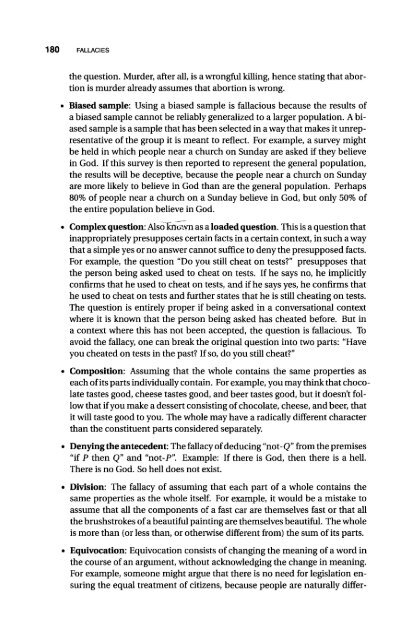An Introduction to Critical Thinking and Creativity - always yours
An Introduction to Critical Thinking and Creativity - always yours
An Introduction to Critical Thinking and Creativity - always yours
Create successful ePaper yourself
Turn your PDF publications into a flip-book with our unique Google optimized e-Paper software.
180 FALLACIES<br />
the question. Murder, after all, is a wrongful killing, hence stating that abortion<br />
is murder already assumes that abortion is wrong.<br />
• Biased sample: Using a biased sample is fallacious because the results of<br />
a biased sample cannot be reliably generalized <strong>to</strong> a larger population. A biased<br />
sample is a sample that has been selected in a way that makes it unrepresentative<br />
of the group it is meant <strong>to</strong> reflect. For example, a survey might<br />
be held in which people near a church on Sunday are asked if they believe<br />
in God. If this survey is then reported <strong>to</strong> represent the general population,<br />
the results will be deceptive, because the people near a church on Sunday<br />
are more likely <strong>to</strong> believe in God than are the general population. Perhaps<br />
80% of people near a church on a Sunday believe in God, but only 50% of<br />
the entire population believe in God.<br />
• Complex question: Also kfiüwn as a loaded question. This is a question that<br />
inappropriately presupposes certain facts in a certain context, in such a way<br />
that a simple yes or no answer cannot suffice <strong>to</strong> deny the presupposed facts.<br />
For example, the question "Do you still cheat on tests?" presupposes that<br />
the person being asked used <strong>to</strong> cheat on tests. If he says no, he implicitly<br />
confirms that he used <strong>to</strong> cheat on tests, <strong>and</strong> if he says yes, he confirms that<br />
he used <strong>to</strong> cheat on tests <strong>and</strong> further states that he is still cheating on tests.<br />
The question is entirely proper if being asked in a conversational context<br />
where it is known that the person being asked has cheated before. But in<br />
a context where this has not been accepted, the question is fallacious. To<br />
avoid the fallacy, one can break the original question in<strong>to</strong> two parts: "Have<br />
you cheated on tests in the past? If so, do you still cheat?"<br />
• Composition: Assuming that the whole contains the same properties as<br />
each of its parts individually contain. For example, you may think that chocolate<br />
tastes good, cheese tastes good, <strong>and</strong> beer tastes good, but it doesn't follow<br />
that if you make a dessert consisting of chocolate, cheese, <strong>and</strong> beer, that<br />
it will taste good <strong>to</strong> you. The whole may have a radically different character<br />
than the constituent parts considered separately.<br />
• Denying the antecedent: The fallacy of deducing "not-Q" from the premises<br />
"if P then Q" <strong>and</strong> "not-P". Example: If there is God, then there is a hell.<br />
There is no God. So hell does not exist.<br />
• Division: The fallacy of assuming that each part of a whole contains the<br />
same properties as the whole itself. For example, it would be a mistake <strong>to</strong><br />
assume that all the components of a fast car are themselves fast or that all<br />
the brushstrokes of a beautiful painting are themselves beautiful. The whole<br />
is more than (or less than, or otherwise different from) the sum of its parts.<br />
• Equivocation: Equivocation consists of changing the meaning of a word in<br />
the course of an argument, without acknowledging the change in meaning.<br />
For example, someone might argue that there is no need for legislation ensuring<br />
the equal treatment of citizens, because people are naturally differ-
















